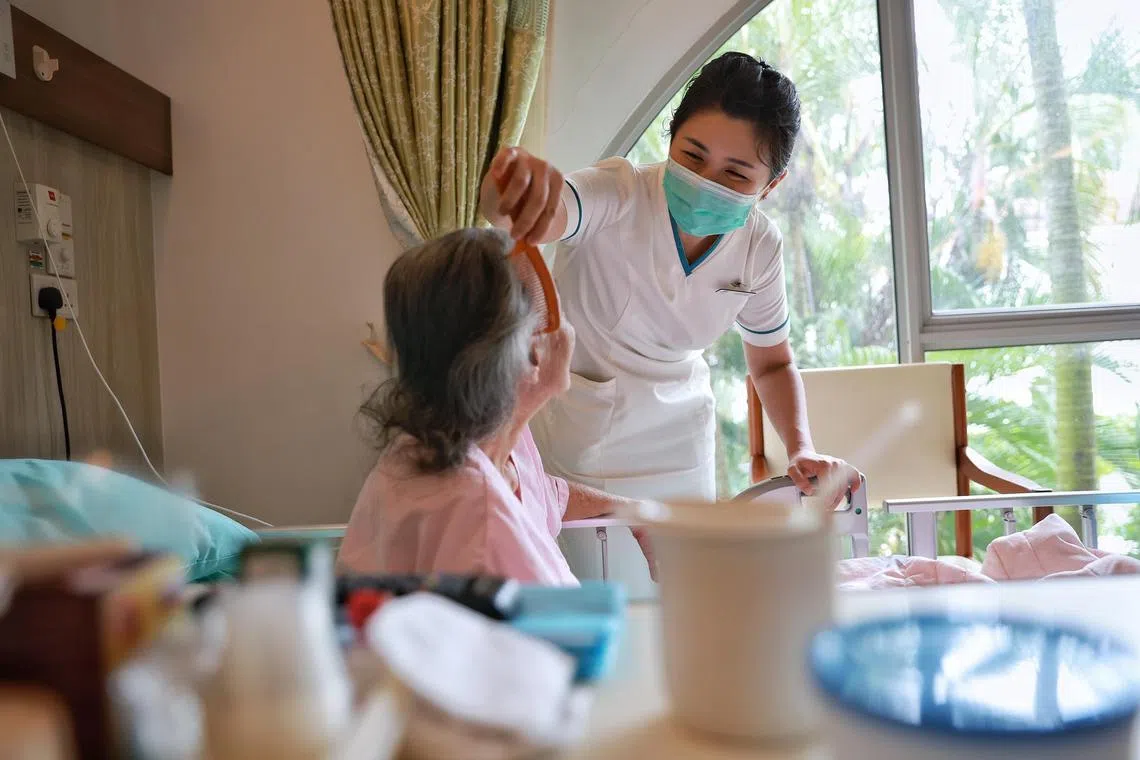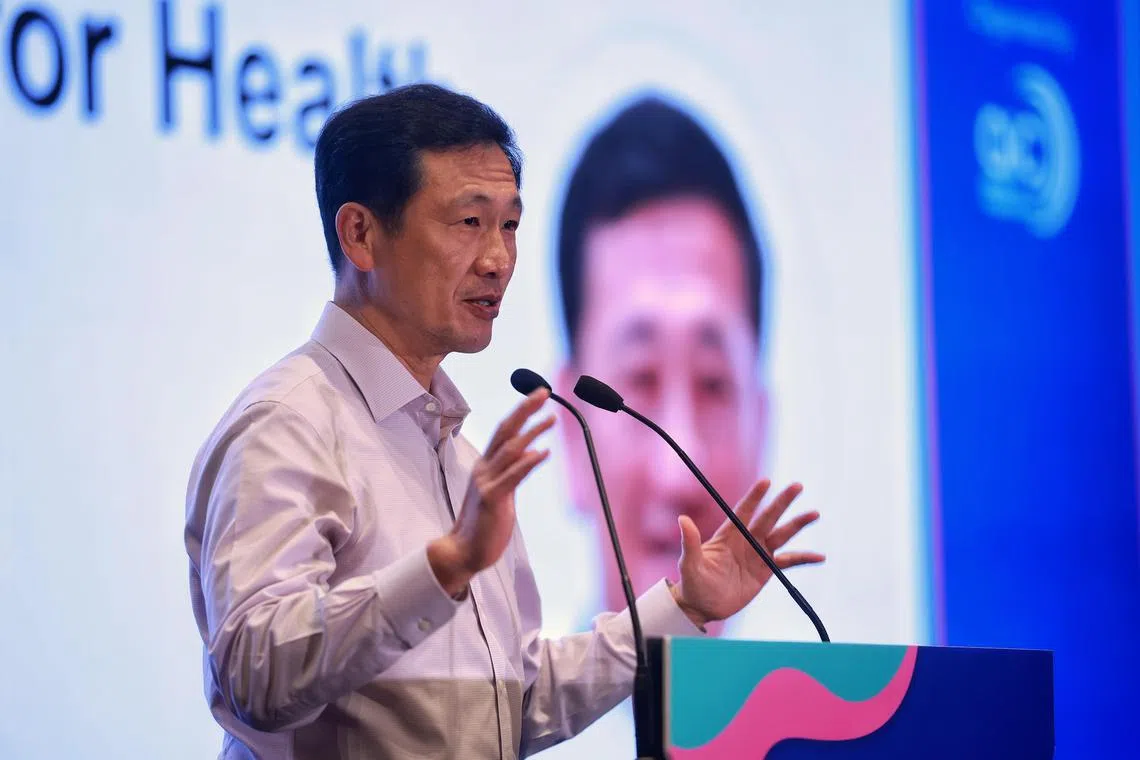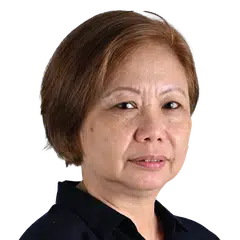Home care to be more affordable with use of MediSave from Oct
Sign up now: Get ST's newsletters delivered to your inbox

The number of people in Singapore receiving community palliative care has increased by 30 per cent over the past five years.
PHOTO: ST FILE
SINGAPORE - Those who are being medically cared for at home will be allowed to dip into their MediSave account to pay for home medical and nursing providers from Oct 1.
Announcing this, Health Minister Ong Ye Kung said his ministry will allow medical service providers funded and supported by the Ministry of Health (MOH) – such as the Home Nursing Foundation (HNF) – to submit claims for their housebound clients, allowing them to tap MediSave, the national medical savings scheme.
This is similar to how they are able to do so for medical services in clinics.
When the scheme stabilises, it will be extended to other home medical and nursing providers, Mr Ong said.
The expansion is part of a larger effort to encourage seniors to live at home for as long as possible, which is much better for them emotionally and medically.
Speaking at the Agency for Integrated Care (AIC) Community Care Work Plan Seminar at the Sands Expo and Convention Centre on Monday, Mr Ong also announced that the Government will allow the use of subsidies and MediSave for video-consultations for home palliative care services from July 1.
This change will financially support telehealth, which is a very useful tool for community care providers, he pointed out.
MOH will progressively extend healthcare financing to support more telehealth services, said Mr Ong, adding that later in 2023, subsidies and MediSave will be extended for teleconsultations for chronic disease management.
The number of people in Singapore receiving community palliative care, also referred to as hospice care, has increased by 30 per cent over the past five years, with about 8,800 terminally ill people receiving such care in 2022.
Said Mr Ong: “We need to and can do more to help and support our seniors to age in communities healthily and happily, with a social circle, surrounded by friends and engaged in activities.”
Hence, the sector will need increased resources, whether it is to recruit more manpower, expand the scope of Active Ageing Centres’ (AAC) work, or promote volunteerism or integrated services.
“This goes beyond what MOH is able to do, and is an issue currently under deliberation by the inter-ministry Forward SG exercise,” he said.
“We recognise that to decisively address our demographic change, and to pre-empt the rapid rise of frailty and other age-related diseases, the Government will need to prioritise spending in this area and develop a major national programme that is as significant as Healthier SG,” Mr Ong said.
Healthier SG is the nation’s new preventive care strategy.
By 2026, Singapore will be a “super-aged” society,

Health Minister Ong Ye Kung said the healthcare system needs to be rebooted to be more effective in letting seniors age in their communities and homes.
ST PHOTO: KEVIN LIM
While nursing home capacity has increased, – with the number of beds almost doubling from 16,000 in 2020 to 31,000 in 2030 – the minister said this is not easily scalable as it requires land and manpower.
“More importantly, it is much better for seniors, medically and emotionally, to age purposefully and actively in their current communities,” Mr Ong said, adding that the country’s “operating model” needs a reboot.
First, there is a need to “significantly, and proactively extend outreach to seniors through a large community volunteer force, by tapping on the good work and capabilities of our Silver Generation Ambassadors, PA and other community volunteers”.
“Second, we need to strengthen our befriending efforts. This will require sustained effort by volunteers. Over time, by building up our relationships with the seniors, we should be able to engage them in community activities.”
Mr Ong said seniors in Singapore also need to be connected to other activities and spaces in the community and that the AACs should be seen as a staging ground.
“It needs to leverage all existing community assets like coffee shops, hawker centres, parks, libraries and community centres, and connect seniors to all activities in the community.“
He said that senior volunteerism should be promoted within AACs to provide people with the opportunity to contribute to the community and help others, as “senior volunteers are a very strong ground asset given their passion and connection with their communities”.
A lot of effort and resources are needed to make the changes, and the community care sector will need stronger support, he said, noting that some of these are “within the ability of MOH to deliver”, such as manpower.
HNF chief executive Christina Tiong told The Straits Times that the foundation “welcomes this policy change greatly” and that it has been working closely with MOH and the Central Provident Fund Board to operationalise the requirements.
Retired civil servant Goh Shih Yong, 74, who is spending his retirement at home with his wife, said he was glad the Government was addressing issues related to hospice care for the sick and elderly in Singapore.
“But more thought can be put into how the family, friends and volunteers can contribute meaningfully to hospice care. It takes time and effort to train and educate caregivers,” he added.
Caregivers of the elderly-sick and children living with disabilities expressed mixed feelings about home care after the announcement was made.
Businesswoman Ang Hwee Suan, 61, who cared for her father at home until his death, said: “This will ease the pressure on healthcare institutions. At the same time, it will benefit the patients who can spend their last days in a familiar environment surrounded by loved ones, and will also lighten the financial burden on caregivers.”
But Mr Adrian Tan, 36, co-founder of social enterprise SG Assist, said there was still a significant need for improvement in the service provisioning of medical services and hospitals.
“Reliance on telemedicine should be seen not only as a cost-saving measure but also as a way to enhance convenience and comfort for those in need of care. So, healthcare providers and policymakers must consider this as they plan and implement these services,” he said.
Mr Tan added that while he was able to tap MediSave to support his mother’s medical expenses, the annual limit for each household family member’s contribution posed some limitations.
“The cap on MediSave contributions can be a significant barrier, especially for middle- to low-income families like ours. I hope the authorities will consider viewing the new teleconsultation and home care services under a separate budget calculation.
“Otherwise, the existing medical expenses that we’ve already tapped may limit us,” he said.
While there is a strong push by the three healthcare clusters to deliver preventive care to the community under Healthier SG, Mr Ong said there is a need to make it easier to escalate cases to secondary or tertiary care.
A “somewhat bitter medicine” involves structuring the care industry for better effectiveness.
Mr Ong said: “While each community provider does good work at its own facilities and settings, at a system level, the varied services can be perceived as fragmented. Care journeys for seniors can be disrupted with multiple assessments and administrative procedures.
“This, in turn, affects accessibility and impedes our effort to ‘right site’ patients.”
MOH is therefore reviewing the way services can be more seamlessly delivered for seniors to age well in the community.
To move in this direction, MOH and AIC will clear the way for providers “to gain scope and scale within a geographical area”.
“We are on the cusp of a major change in the community care sector,” Mr Ong said. “It will fundamentally revamp the way we look at aged care. The refreshed system will be more effective, focusing on prevention of diseases, preservation of health, and giving purpose and agency to seniors to age in their communities and homes.”
“It will require all our contribution and help, and our support in realising the vision.”



